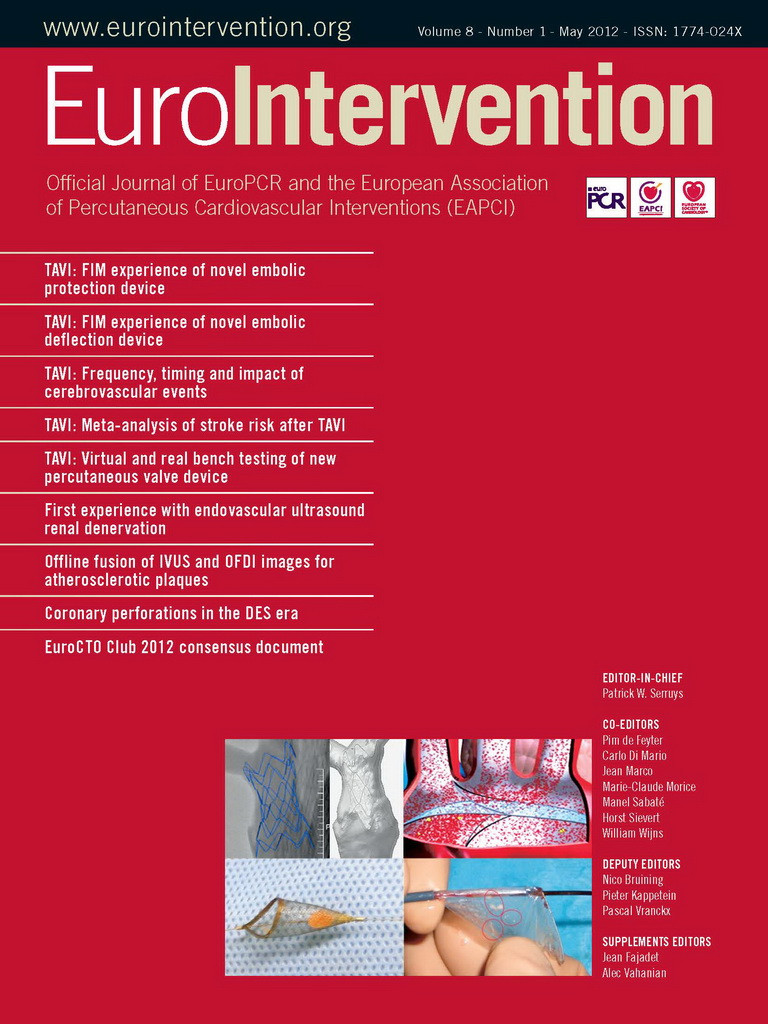Dear Colleagues,
As we prepare our bags for EuroPCR, we know we are coming to Paris this year with our pockets full of good news. First, we have proudly entered the “age of reason”…you certainly remember that moment in childhood when you pass the age of seven and are now called “rational” by your parents and peers. Well, EuroIntervention has arrived, we have now entered our “l’âge de raison”, we have now left our seventh year of publication and today we enter our eighth year!
You will see that even with our new found maturity Volume 8’s first publication is as exciting as usual and is focused, in part, on stroke post TAVI. New techniques always seem to generate new enemies and complications which have to be quickly understood, controlled and mastered. In the present issue, we publish two FIM papers on filter and deflectors to avoid embolic stroke: one of these was selected to be an EEP (Editorial Expedited Publication). EEPs are fast becoming one of EuroIntervention’s distinctive trademarks – articles that the editors believe are of timely and critical importance to you are published within 72 hours after acceptance by an accelerated review process. Our EEPs made the news during the ACC 2012 in Chicago when we published a new series of data on the recently described complication with stenting, namely longitudinal stent compression.
The Year of the Textbook
EuroIntervention is not alone in promoting education and innovation. This year is “the Year of the Textbook” –a major endeavour would be an understatement– and our journal has participated in this immense project born out of the collaboration of EAPCI and EuroPCR. Together, we have created this mega-mammoth textbook covering the entire field of interventional cardiology and, as we suggest in the introduction to this book, it is the result of an association –a group effort– and not the product of any single individual or individual group. In other words, editors will change, but the textbook will remain as a permanent cornerstone of PCR, the EAPCI and the European Society of Cardiology. It will be an integral part of what we do here at EuroIntervention, reflecting our on-going work, and a central rendezvous during the entire year with the PCR family.
In addition, next to this enormous publication, we have produced a more compact, yet extensive, innovative and colourful adventure in interventional education and information – the OCT Atlas prepared for the iPad which is going to “ravish” many, if not all of our readers.
China
Internationally, this journal has from its inception been deeply involved with international communities of interventional cardiology far from the confines of our continent. Our intentions in this respect can be seen in our historic relationship with SOLACI in South America as well as AsiaPCR and GulfPCR. As we look to the East, we have been more and more impressed by the work emerging from China, and recently during our participation at CIT in Beijing we entered into serious discussions with Professor Gao, who you might remember was our EuroPCR Ethica Award winner of 2011. The sentiment between us is mutual, with a strong desire to bring together and intensify the relationship between EuroIntervention and Chinese interventionists. Many interesting publications in our field are exclusively published in Chinese without ever reaching other parts of the globe, and we pledge to help change that, committing ourselves to bringing these intriguing perspectives, innovative studies and reports to an international audience, exposing them to the rest of the world. We will keep you abreast of our continuing efforts to further solidify our relationship with our Chinese colleagues.
New dimensions in interventional medicine
This year at EuroPCR marks what will be seen as another beginning. Jacques Moret, professor and chairman of the department of Interventional Neuroradiology at Beaujon University Hospital in Clichy, France, has been invited to deliver the keynote lecture during the opening day of EuroPCR 2012. The reason for inviting an interventional neuroradiologist will become increasingly clear as Professor Moret speaks about his concerns in an editorial we are publishing in this issue of the journal. A dedicated practitioner who as a neuro-interventionalist is practising Percutaneous Interventional Cardiovascular Medicine every day, even though the brain, not the heart, is the end organ he is taking care of. A renowned teacher and speaker, he will outline, during his keynote lecture, the striking similarities between the demands imposed on revascularisation treatment of acute ischaemic stroke and those of acute myocardial infarction. He is delivering a strong message to our interventional community, which I am sure you will all be fascinated to hear and, more importantly, and this marks the addition of a new interventional strategy to add to the growing realm of percutaneous interventional medical treatments. Along with the textbook, along with our opening to China, interventional neuroradiology heralds a new maturity for our practice and our speciality.

